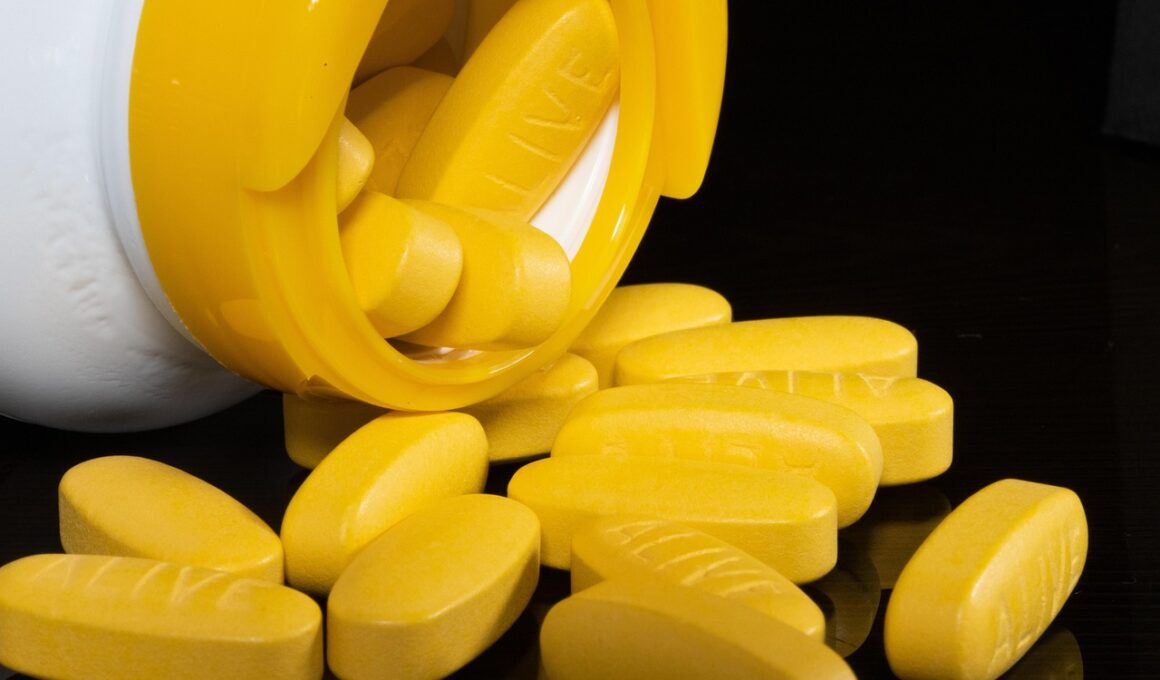Essential Micronutrients in Pre-Workout Nutrition for Faster Recovery
Pre-workout nutrition is often overlooked when considering recovery. However, it plays a vital role in how well your body can recover post-exercise. Essential micronutrients are compounds that must be ingested through food, as the body cannot produce them. These include vitamins and minerals that aid in cellular repair and function. For instance, Vitamin C, a powerful antioxidant, helps to mitigate oxidative stress produced during workouts. Meanwhile, B vitamins are important for converting carbohydrates, proteins, and fats into energy efficiently. Adequate magnesium levels can prevent muscle cramps and spasms during working out. Including a variety of fruits and vegetables can ensure that athletes consume adequate micronutrients, which are necessary for optimal recovery. Minerals like calcium are important for bone strength, while zinc helps in muscle repair. These micronutrients can enhance muscle protein synthesis, ultimately contributing to quicker recovery times. In summary, focus on balancing macronutrients with these vital micronutrients to support performance. Ignoring these essential components can slow recovery and impact your training schedule.
One often underappreciated element in pre-workout nutrition is electrolytes. Electrolytes like sodium, potassium, and calcium play crucial roles in rehydration and muscle function during and after workouts. When we sweat, we lose these critical minerals, leading to imbalances that can impede recovery. Proper electrolyte replenishment enhances hydration, thus encouraging better nutrient transportation throughout the body. A well-hydrated system allows for quicker nutrient uptake by the muscles after training, facilitating recovery. Drinks containing electrolytes, along with fruit sources rich in these minerals, can help maintain electrolyte balance. Foods such as bananas (high in potassium), avocados (rich in magnesium), and dairy products (for calcium) should be included in your pre-workout meal plan. Understanding how electrolytes work can further improve your hydration strategy. Some athletes might consider a pre-workout electrolyte supplement to ensure optimal performance. Balance is key; overconsumption can lead to gastrointestinal discomfort. In conclusion, a strategic approach to electrolyte intake can dramatically improve recovery times, enabling athletes to maximize their training efforts.
Vitamin E is another critical micronutrient that should not be overlooked. It is known for its antioxidant properties, which can help to reduce exercise-induced oxidative stress. By neutralizing free radicals produced during intense physical activity, Vitamin E extends the longevity of muscle cells and aids in recovery. Nuts and seeds are excellent sources of this vital vitamin, making them perfect snacks pre-workout. Furthermore, recent studies suggest that Vitamin E supports immune function, essential for active individuals facing stress on their bodies. A compromised immune system can lengthen recovery times, affecting training consistency. Adequate Vitamin D levels can also complement recovery efforts by promoting calcium absorption and muscle function. Food sources such as fatty fish and fortified dairy can meet dietary needs. Alternatively, safe sun exposure can boost Vitamin D levels effectively. Through careful planning and education around nutrient needs, athletes can enhance their recovery process. Overall, integrating adequate Vitamin E and D in pre-workout meals can set a solid foundation for recovery after strenuous exercises.
The Role of Antioxidants
Antioxidants are crucial in pre-workout nutrition as they play a significant role in counteracting the oxidative stress that workouts impose on the body. Oxidative stress can lead to muscle fatigue and prolonged soreness, ultimately affecting overall performance. Including a range of colorful fruits and vegetables can ensure a high intake of antioxidants. For example, berries, kiwis, and spinach are powerful sources, providing not only antioxidants but also essential vitamins and minerals. Consuming these foods pre-workout sets the stage for a more robust performance and less post-exercise soreness. Integrating a diverse array of antioxidant-rich foods can help to eliminate free radicals and reduce inflammation. Moreover, some studies indicate that omega-3 fatty acids, found in fish like salmon, also possess significant antioxidant properties. Incorporating both plant-based and animal-based sources of antioxidants can create a well-rounded pre-workout meal plan. Understanding how these nutrients interrelate is foundational for athletes seeking optimal recovery. To maximize your pre-workout meal, prioritize a colorful array of nutritious options.
Protein intake is also key in pre-workout nutrition, but it does not stand alone. To recover effectively, the body needs certain micronutrients that help in protein synthesis, the process by which the body builds new muscle. Micronutrients like Vitamin B6, found in poultry and fish, are paramount for this process. Calcium also plays a role in muscle contractions and recovery. Additionally, the presence of Vitamin C aids in collagen production, which supports muscle repair. A combination of protein sources with a variety of micronutrients can enhance recovery. Ideal pre-workout meals could be a blend of Greek yogurt with berries, producing both protein and antioxidants. This combination fuels muscles while helping to mitigate damage occurs during training sessions. Supplementing your meals with a comprehensive vitamin and mineral complex can also be a considered strategy. The goal is to optimize muscle repair and growth, resulting in effective workouts and enhanced performance. In the end, focusing on ideal protein-micronutrient combinations will help you recover faster and sustain ongoing high-level athletic training.
The incorporation of healthy fats in pre-workout nutrition may seem counterintuitive, yet these fats are foundational to nutrient absorption. Healthy fats support the absorption of fat-soluble vitamins, specifically Vitamins A, D, E, and K, which are essential for recovery. For instance, avocados and nuts are prime examples of healthy fat sources that also contain micronutrients. Including such foods will consequently enhance your overall meal’s nutrient density. Omega-3 fatty acids, found in fatty fish and flaxseeds, are also known for their anti-inflammatory properties, further facilitating recovery. Additionally, fats provide a sustained energy source that may be advantageous during longer workouts. Therefore, meal planning should account for this balance of macronutrients and micronutrients. Before your workout, consider preparing meals that emphasize healthy fats paired with an appropriate amount of carbohydrates and proteins. Smoothies generally work well; utilizing ingredients rich in healthy fats can be a delicious and nutritious option. Remember, a well-balanced pre-workout meal can enhance your performance while expediting recovery.
Hydration and Recovery
Hydration is perhaps the most significant yet frequently neglected micronutrient-related element of pre-workout nutrition. Dehydration can severely impair muscle recovery, diminish performance, and delay the healing process of muscles. Water plays a fundamental role in various bodily functions, including nutrient transport, which directly influences recovery. During workouts, fluids are lost through sweat, creating the need for replenishment. Alongside basic water intake, incorporating hydration-rich foods can assist in maintaining fluid balance. Fruits like watermelon and cucumbers not only hydrate but also contribute invaluable micronutrients. Drinking water throughout the day is just as essential; aiming for adequate fluid intake pre- and post-exercise can facilitate body function and efficiency. It’s smart to consider factors like exercise intensity and environment when determining hydration needs. In addition, consider electrolyte drinks in case of extreme sweating to restore lost electrolytes. Ultimately, optimizing your hydration plan significantly improves your recovery timeline and overall performance, allowing for effective training sessions. Actionable steps toward hydration can elevate your pre-workout experience and contribute notably to recovery.
In summary, the impact of micronutrients on pre-workout nutrition is pivotal for faster recovery. Each micronutrient plays a unique role that contributes to both performance and recovery, ultimately influencing athletic progress. Antioxidants mitigate muscle damage while vitamins and minerals assist in muscle repair and energy metabolism. Protein helps in the building of new tissues, while healthy fats supply sustained energy and enhance nutrient absorption. Adequate hydration ensures that bodily functions operate efficiently, ultimately expediting the recovery process. Athletes must prioritize a diverse and balanced approach to pre-workout nutrition by strategically including micronutrients. This education allows for better food choices that align with athletic goals. Addressing both macro and micronutrient intake directly affects recovery speed and future performance. Ultimately, consistent awareness and application of these nutritional principles can showcase noticeable improvements in recovery time and overall fitness achievements. Athletes looking to boost their recovery and performance should focus on understanding the coupled role of these essential micronutrients in their pre-workout meals.


